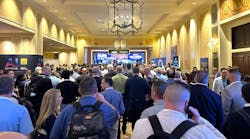The staff at SecurityInfoWatch.com gets to see scores of news stories relating to the security industry, from almost laughable stories like missed items at airport screening operations, to serious stories of security directors who have expensive equipment sitting idle because they can't afford to hire staff to operate the equipment.
This past week was flat out full of stories that make you turn your head and examine our industry. As they say in the newsroom, if it bleeds, it leads, and that was the case this week when we posted a story from New Jersey about a scientist who ended up dead in a secure area at a New Jersey water facility. In this bizarre story -- we're sure it's being written up for "Law & Order" already -- a scientist working at the Passaic Valley Water Commission Plant wound up inside an underground holding tank, possibly drowned by a coworker. While the story says lots about how the crime scene was managed (poorly, it seems), the story also raises issues of where security "ends" inside a facility.
The big news this week was that a British study says that CCTV systems don't necessarily reduce crimes. On a positive note, after Britain has spent some $325 million and installed 4.2 million cameras, the study said the cameras have helped slightly decrease crime in parking lots -- just try taking those kind of results to your next budgetary meeting! Of course, we still have the evidentiary uses of CCTV, which is really what cameras are best at anyway -- at least until new softwares make cameras work even smarter.
From the news-creating the world of transportation security, a story was filed alleging that there was a concerted effort at the San Francisco airport to alert workers of the presence of would-be covert TSA inspectors. The suit also alleges that scores of items were missed at checkpoints and unchecked passengers were sometimes allowed to board aircraft. I sincerely hope that these allegations aren't true, but if it is true, this is a stark reminder of how far we need to go to improve air security. It wasn't long ago that the TSA allowed privatization of airport security operations, and as an industry, we have to show that the private sector is capable of doing the job.
And finally, our most read story this week was the piece about the SAIC break-in. I'm not sure whether it was the fact that the break-in occurred at a government security contractor, or the fact that the thieves just had to smash windows to gain access, or what, but this story was a big hit -- even without a mention of Paris Hilton's cell phone. As a recap: the break-in saw the theft of computers containing personal information on stockholders, a list that would have included some very high-level people in our government. It's still unclear whether the computers were stolen for their hardware value or for the information they contained, but either way, this story is a strong reminder that IT and physical security must work together.
That's it for this week; we'll see you next Friday for the weekly recap. In the meantime, follow SecurityInfoWatch.com for your daily news from the security industry.
Regards,
Geoff Kohl, editor
SecurityInfoWatch.com
---
Got a tip on a story you think we should cover? Email us at [email protected].

